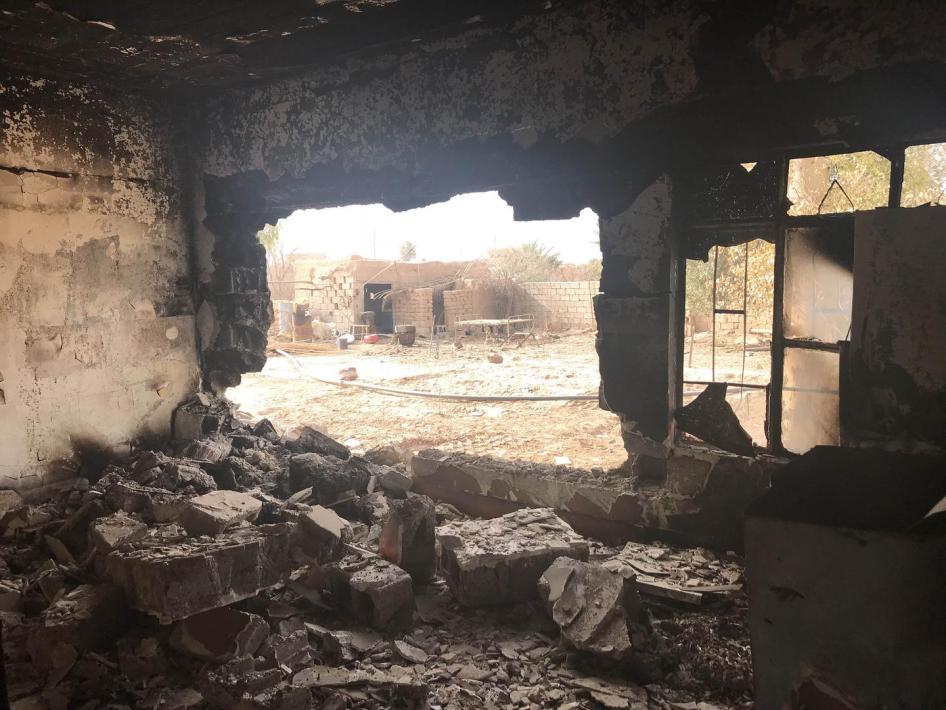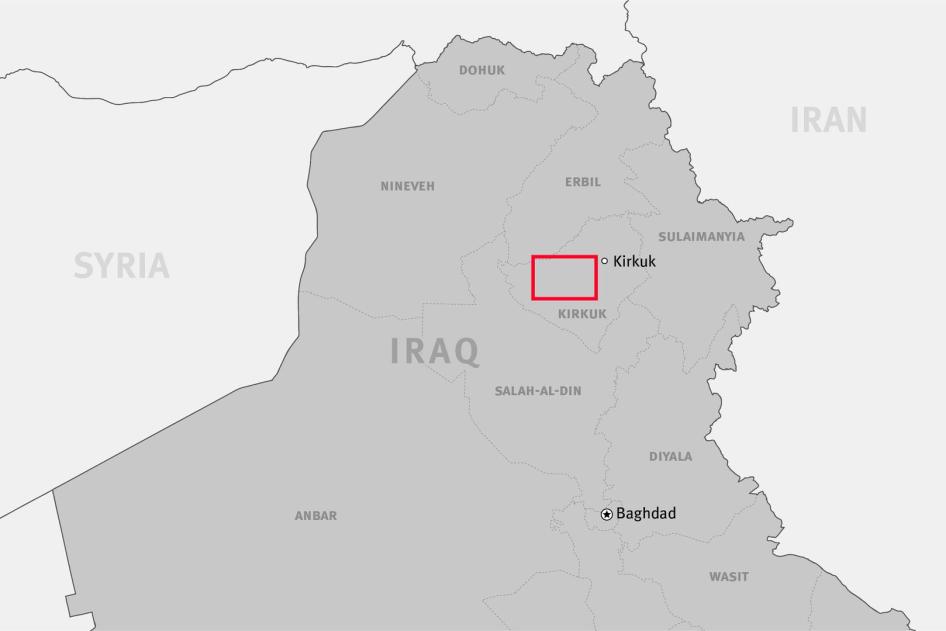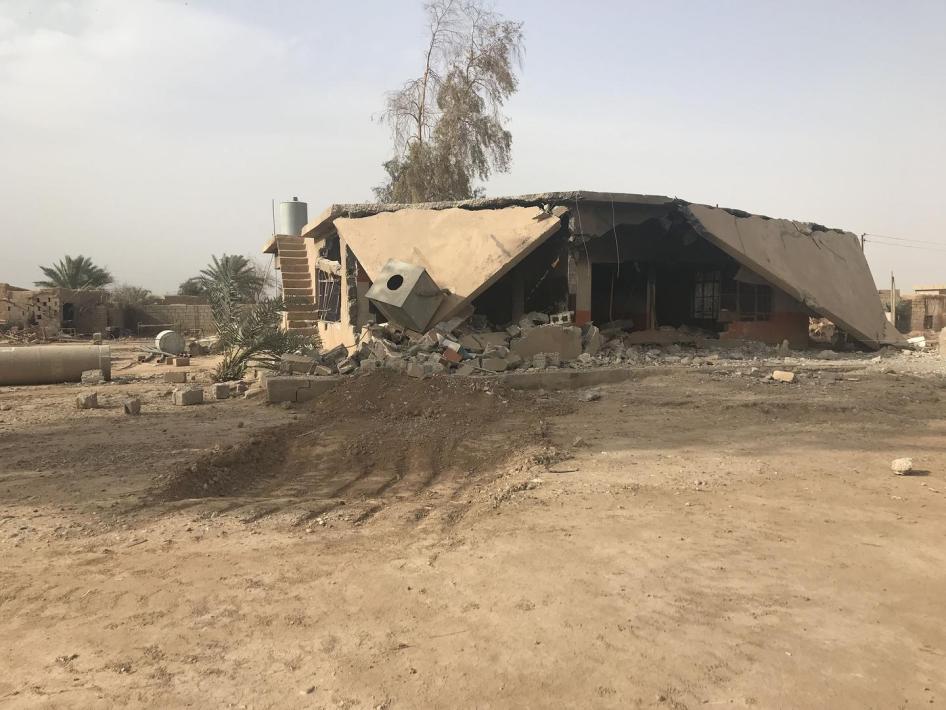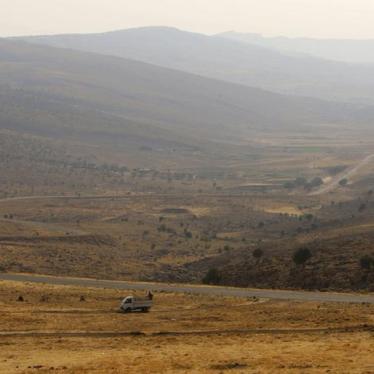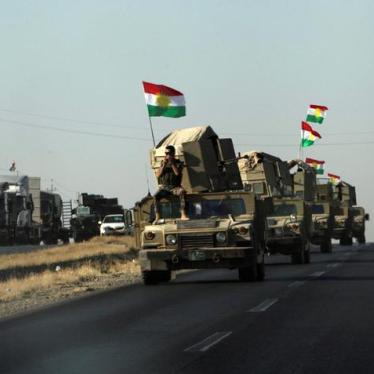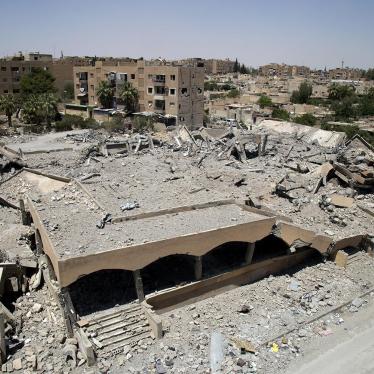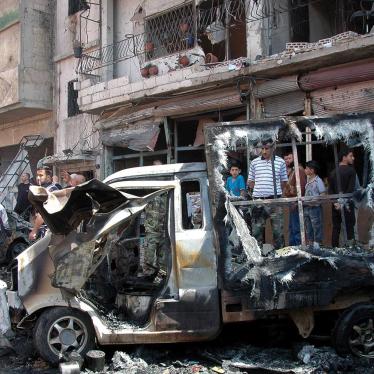(Mosul) – Officials, camp management, and three international organizations have confirmed that in early January 2018, Iraqi forces forcibly displaced at least 235 families of suspected affiliates of the Islamic State, also known as ISIS, Human Rights Watch said today. Most have been forced to go to Daquq camp, in the Kirkuk governorate, and a smaller number to two other camps in the area.
As these families were being displaced, groups within the Popular Mobilization Forces (PMF), also known as the al-Hashd al-Sha'abi, destroyed some of their homes, forced some parents to leave children behind, stole some of the families’ livestock, and beat at least three of the men.
“How can Iraq claim it’s turned a corner and supports reconciliation when its own forces are waging collective punishment on civilians,” said Lama Fakih, deputy Middle East director at Human Rights Watch. “Nothing positive can be gained from government complicity in furthering divisions in Iraqi society.”
The manager of Daquq camp, 30 kilometers south of the city of Kirkuk, told Human Rights Watch during a January 23, 2018 visit that the camp had received 220 families since January 4. All were from villages in the Hawija area, west of Kirkuk, and were brought to Daquq by Iraqi forces because they allegedly had ISIS-affiliated relatives.
Some had previously been residents of the camp or other camps for the displaced between 2014 and 2016, when their homes were in areas under ISIS control, and had returned to their homes in November 2017, after Iraqi forces retook these locations. While a number of aid groups work in the camp, it has limited medical and educational services. A representative from an international organization confirmed that forces forcibly displaced at least 15 more families to two other camps in the area.
Human Rights Watch interviewed 24 people from 19 families, who said they had been brought to the camp between January 4 and 9. These families came from 10 villages: al-Dhirban, al-Alwiya al-Jadida, Garhat Ghazan, Gharifi, Kaysuma, Kifah, Maftool, Maratah, Murabata, and Sayid Hamid. All except one person readily admitted that they had relatives who joined ISIS.
They said that PMF and army forces rounded up the families with no warning in a coordinated effort based on lists of names they had compiled and brought them to the camp after screening at military bases. They said that when they asked why they were being displaced, soldiers told them they were innocent but had to move to the camp because their relatives had joined ISIS.
On January 24, a lawyer and a human rights worker in Hawija told Human Rights Watch that there were no federal or provincial decrees or orders to displace these families, and a Hawija judge reiterated that from a legal perspective, these families had done nothing wrong and should not be sanctioned.
Independent observers at Daquq spoke to three men from the same village on the day they arrived, who said PMF forces had beaten them. The men showed the observers their backs, which were covered with large purple bruises. The observers took photographs, which they showed Human Rights Watch. People from that village told Human Rights Watch that PMF forces had beaten them but that they were afraid to provide more details.
The observers said they spoke to a group of men and women from two other villages who also said that PMF forces beat them, with one woman showing bruises to her arms and legs, which they also photographed.
“Ahmed,” 40, and his wife “Lama,” 36, said that on January 4, forces from the PMF unit “Ali Akbar” and the Iraqi army’s 9th division came to their home and said the couple were wanted for a brief questioning. Military officials encouraged them to leave five of their seven children at home, allowing them to take only the two youngest with them. Fighters then took them in a bus to a nearby town for screening, and then sent Lama and her two infants onto Daquq. “I begged them to let me go home and pick up my other children, but they would not let me,” she said.
PMF forces took Ahmed and 25 other men and boys from his village, all blindfolded, to an army base where they were forced to sit on the cold, wet ground, he said. After several hours, soldiers brought the men to the camp as well. It took Lama and Ahmed five days to find a relative who could bring their other children to the camp.
Those interviewed by Human Rights Watch and the camp manager said that the local police working in the camp have confiscated their families’ identity papers and are holding them so that none of the families can flee. If one member of a family finds someone inside the camp to sponsor them and gets permission to leave, for example to go to the hospital, only that member of the family can leave, but the rest must stay behind to ensure their return, the manager said.
Three families told Human Rights Watch that as they were being forced to leave their towns, they saw men wearing PMF uniforms destroying their homes with bulldozers and setting the homes on fire. Two other families said that neighbors who remained behind notified them that the day they were displaced fighters destroyed their homes but did not know by what means.
Human Rights Watch reviewed satellite imagery that was available for three of the villages – Garhat Ghazan, Kifah, and Sayid Hamid – which corroborated the destruction of eight homes by heavy machinery between January 3 and 9, as well as the destruction of 21 homes in the nearby village of Safraa over the same period. Researchers were able to visit the destroyed home of one of the families in Maratah and corroborated family members’ statements. Researchers saw signs of destruction of at least six homes in another three villages – al-Khan, Rasuliya, and Agulah – during the same period but were unable to enter the villages to carry out a more detailed assessment.
A local human rights activist confirmed that families were displaced from the three villages in the beginning of January, and satellite imagery available for one of the villages confirmed the destruction took place between January 3 and 9. The villages of the rest of the displaced people interviewed in the camp, to the southeast, south, and southwest of Hawija city, were unsafe to visit.
It is a basic international standard that punishment for crimes should only be imposed on people responsible for the crimes, after a fair trial to determine individual guilt. Imposing collective punishment on families, villages, or entire communities is strictly forbidden and can itself be a crime, especially if it results in forced displacement.
Under the laws of war, forced displacement of civilians is strictly prohibited except in the limited cases in which displacement is necessary to protect civilians or for military necessity, and then only for as long as it is needed. Under the Rome Statute of the International Criminal Court, it is a war crime to order such unlawful displacements of civilians during a conflict. Widespread or systematic unlawful forced displacement imposed as a policy of the state or organized group can amount to a crime against humanity.
Iraqi authorities should take immediate steps to investigate these alleged war crimes and other allegations of unlawful demolitions, looting, and destruction of civilian property, Human Rights Watch said. They should hold armed forces that loot or destroy civilian property to account. The committee established by law to compensate victims of “terrorism and military errors” should process claims of victims of looting and destruction by armed forces.
“Iraqi authorities forcibly displacing these families are condemning them to a bleak future of difficult economic circumstances, restricted educational opportunities, and dismal living conditions in prison camps,” Fakih said.
Accounts by People Displaced
“Karim” said that on January 4, the PMF’s Ali Akbar unit and army forces took his and his neighbors’ families to a school in a village five kilometers away and interrogated the men for an hour, then took them home and told them they had to move to Daquq camp.
“When I got home, I saw that in the hour we were gone, forces had levelled our home and stolen my livestock – two cows, 44 chickens, and 105 sheep,” he said. “I reported the theft to a PMF internal intelligence officer once I got to the camp, who identified the perpetrator, a local that I know, who is a member of a tribal unit, the Hashad al-Asha’ri, and got 55 of my sheep back, but not the rest.”
The Hashad al-Asha’ri (“Tribal Mobilization” Forces) he was referring to are a part of the Popular Mobilization Forces. Soldiers then brought him and his family to Daquq camp along with their neighbors.
“Jamil,” 62, from another village, told researchers two of his two sons had joined ISIS. One died, and the other fled the area before Iraqi forces came. After October 3, when Iraqi forces retook the area, PMF forces went to Jamil’s house, harassing him and once detaining him for eight days, alleging he had collaborated with ISIS and blaming him for his sons’ affiliation, before releasing him. He eventually moved to a farmhouse outside of the village with his family to avoid continued harassment from these forces.
On January 9, PMF armed men, whose affiliation Jamil was unsure of, came to the farmhouse and took Jamil to his home in the village. He saw that a group of 9th division soldiers had been sleeping in huts in his yard. Jamil and the soldiers watched as the PMF brought a bulldozer and demolished his house, after which they set the interior of his house on fire. Jamil’s wife, who was also there, begged them to let her fetch some things from the house, but they said no.
The armed men then took them to a screening center in a nearby town, and then to the camp. On January 24, researchers visited Jamil’s destroyed home, and spoke to nine villagers who had been in the neighborhood at the time of the PMF’s attack on Jamil’s home and corroborated the accounts.
Jamil said this was not the first time he was targeted. He and two other men from his village now living at the camp said that local members of the Hashad al-Asha’ri forces whom they knew by name had stolen six of their sheep at gunpoint on December 20, and 10 of their cows on December 28. Following that incident, the army intervened and forced them to return the cows. Jamil said the same men looted his house and stole his car on December 25. Although he was not at home at the time, he was close by and witnessed this theft.
Jamil’s neighbor “Mahmoud,” 34, also now in the camp, said that his uncle, who is still in the village and looking after Mahmoud’s livestock, called and said that since Mahmoud had left, the same forces had come and taken 17 of his cows and warned they would take the remaining 30 soon.
Human Rights Watch visited and saw that Jamil’s burned-out home was empty and saw the remnants of Jamil’s livestock area. Human Rights Watch also visited the base of the local Hashad al-Asha’ri unit Jamil said was responsible for the looting and saw three cows tethered to the building but could not confirm whether they were the stolen cows. “Why did they feel safe in targeting us and robbing us like this?” Jamil said. “Because we are seen as ISIS families.”
